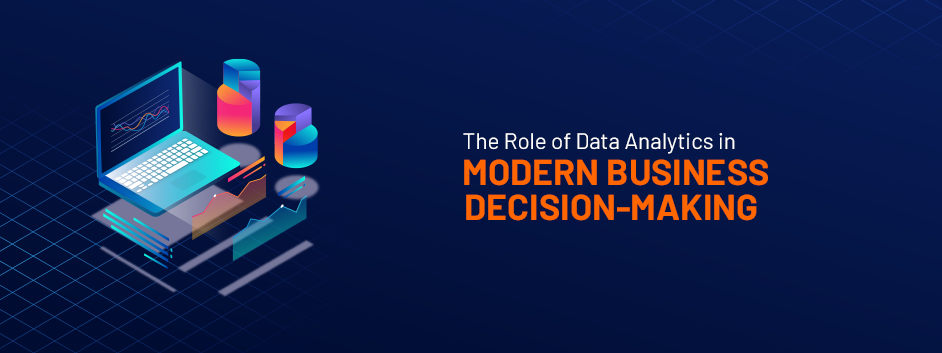Data is a critical part of the business world. It ensures informed decisions, optimizes operations, and helps businesses stay competitive. Companies must rely on data analytics to transform raw data into actionable insights that drive strategy, innovation, and growth. Thus, data analytics in business is no longer an option but essential for success. Embracing data-driven decisions is the only way to respond faster to market changes and enhance customer experiences.
Table of Contents
What is Data Analytics?
Role of Data Analytics in Business Decision-Making
Informed and Accurate Decisions
Enhanced Customer Understanding
Operational Optimization
Risk Management
Competitive Advantage
Future Considerations
Conclusion
FAQs
What is Data Analytics?
Data analytics is the systematic process of gathering, organizing, processing, and analyzing data to uncover valuable insights, trends, and patterns. Its types involve:
- Descriptive Analytics: What happened?
- Diagnostic Analytics: Why did it happen?
- Predictive Analytics: What is likely to happen?
- Prescriptive Analytics: What should we do about it?
Data analytics analyzes every part of the business’s operations and provides smarter, data-driven decision-making.
Role of Data Analytics in Business Decision-Making
Data analytics influences business decision-making by offering a solid foundation for critical insights, based on actual data rather than assumptions.
Informed and Accurate Decisions
Data analytics avoids guesswork and provides solid, data-driven decision-making. Gaining insights from historical data helps them understand what has worked for the company and what hasn’t. Current data gives informed decisions on whether it’s the right time or not to launch a product or service expansion into new markets.
For example, a financial services platform can use data analytics to detect fraudulent transactions.
Enhanced Customer Understanding
Businesses can make a profit when customers purchase from them. They depend on them to run the business successfully, but customers can choose any option to buy products and services. Thus, they are considered gods in business. Data analytics deeply analyzes customer data to gain knowledge of their purchasing behavior and feedback. These insights allow them to tailor their offerings, improve customer satisfaction, and build lasting relationships.
For instance, a subscription-based platform, Amazon Prime, uses data analytics to recommend shows based on viewing history. This type of approach is called personalization recommendations and enhances the user experience.
Operational Optimization
Business sustainability depends on cost control. Analytics helps identify inefficiencies and bottlenecks within the process, meaning it uncovers possible areas for cost optimization. Data analytics supports real-time monitoring and predictive maintenance, and this helps businesses to address problems before they escalate. As a result, organizations can save significant costs and achieve long-term business sustainability.
For example, in supply chain management, analytics reveal delays in delivery, excess inventory, or unnecessary logistics costs.
Risk Management
Data analytics is not all about seizing opportunities; it’s also about reducing risks in an organization. Detecting potential risks earlier helps companies take proactive steps rather than reacting after damage is done.
For instance, identifying warning issues such as financial fraud, supply chain disruptions, cyber threats, or market volatility, and developing mitigation strategies to prevent major losses.
Competitive Advantage
Spotting trends, identifying opportunities, and quickly adapting to market changes before their competitors do helps businesses gain a competitive advantage. This increases growth and builds more agile and resilient businesses.
Future Considerations
Data analytics is a must-have tool for modern businesses. Surviving in the business world has become increasingly difficult without data-driven decisions. Decisions based on assumptions alone aren’t effective. This can result in significant losses and is not sustainable over time. Since data-driven decision-making empowers businesses by offering accuracy and reducing uncertainty, the demand for data analysts is increasing rapidly. In the future, individuals in the role of data analysts can gain the competitive advantage of strong career prospects and higher salaries.
Studying a data analytics degree can be a smart investment. If you are looking to gain a deep understanding of the power of data, the MBA in Data Analytics course provided by Presidential Graduate School (PGS) can be ideal. With our program, you will receive hands-on experiences of interpreting and harnessing data.
Conclusion
With many jobs being replaced by AI, data analytics is one of the tools that complements human expertise rather than replacing it. Mastering data analytics ensures a promising career in the evolving digital world. Enroll in the MBA in data analytics course of PGS and gain the skills, knowledge, and hands-on experience needed to excel as a data analyst. Become a valuable asset in a data-driven business environment by unlocking your potential to transform data into powerful business insights and drive impactful decisions with PGS.
FAQs
What is the role of a data analyst?
The role of data analysts includes transforming data into valuable insights. They clean and organize the available raw data, perform statistical analysis, and create visualizations to discover trends and patterns. This helps businesses to make data-driven decisions.
What are some of the pitfalls of data analysis?
Over-dependence on data may sometimes lead to misinterpretation, so a balanced approach of data and industry knowledge must be applied to avoid such a condition. Managing security and addressing privacy concerns are some of the additional hurdles.
What is the course duration of the MBA in data analytics program offered by PGS?
PGS’s MBA in data analytics program is a two-year, 60-credit program with a comprehensive syllabus that will stand out in a data-driven world

